We are empathetic beings who feel for each other. Our very success as a species is rooted in our ability to be aware of each other’s needs, to notice each other’s pain and to experience deeply felt physiological and emotional empathy.
—Kae Tempest, ‘On Connection’ (London: Faber, 2022, p 47)
In March 2024, Atelier Kunstnerforbundet (Curator Martina Petrelli / Project Manager Anne Marte Archer) hosted Paola Jalili and Katie Lenanton from the curatorial and editorial platform Feminist Culture House (Helsinki, Finland) to run a series of workshops based on their work on ‘Studio Visit Ethics’ and ‘Needs’. On this occasion, Paola, Katie, and their Feminist Culture House colleague Gladys Camilo developed a new workbook publication to promote intersectional feminist tools for artistic collaborations, titled ‘Getting on the Same Page: Tools for Feminist Working Practices’.
Katie and Paola also publicly presented Feminist Culture House’s practice, and the work developed collaboratively during the workshops, in the Loft of Atelier Kunstnerforbundet. To expand on the ‘Getting on the Same Page’ workbook topics of intersectionality and support, the event included a conversation between Katie, Paola, and Patricia Carolina and Sarah Kazmi from Verdensrommet, who talked about their work on immigration policies and solidarity amongst art practitioners in the Nordic region, structural and administrative ways to support non-EU and EEA artists; and the speakers’ disparate but shared efforts in advocating for a more equitable world for all.
For more background about the collaboration, visit this page. Atelier Kunstnerforbundet was able to host Feminist Culture House thanks to generous economic support by Arts and Culture Norway (Kulturrådet / Gjesteoppholdsstøtte). Atelier Kunstnerforbundet is an infrastructural experiment inside Kunstnerforbundet’s premises, and is project-funded by DNB Sparebankstiftelsen and Talent Norge.
The workshop structure followed the ‘Getting on the Same Page’ workbook, which served as a tangible anchor to approach tools, exercises, and research to aid and encourage the voicing of needs and boundaries when planning artistic collaborations, and more. The workbook also served as a tool for consciousness-raising, both as a method and a means for action and organising, and to amplify movements of searching for better ways of living and working.
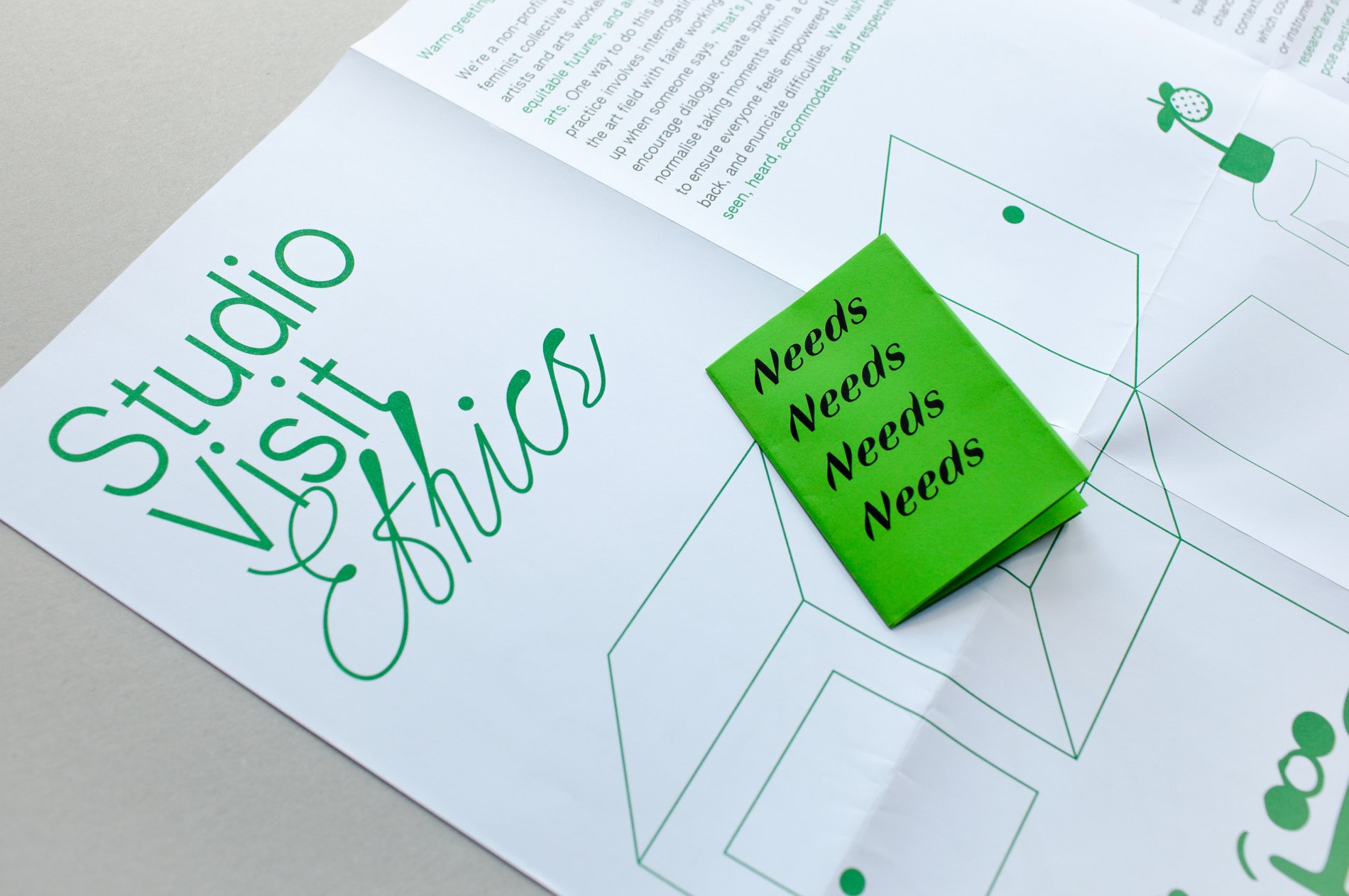
'Studio Visit Ethics' and 'Needs' publications by Feminist Culture House. Photo: Monika Żak
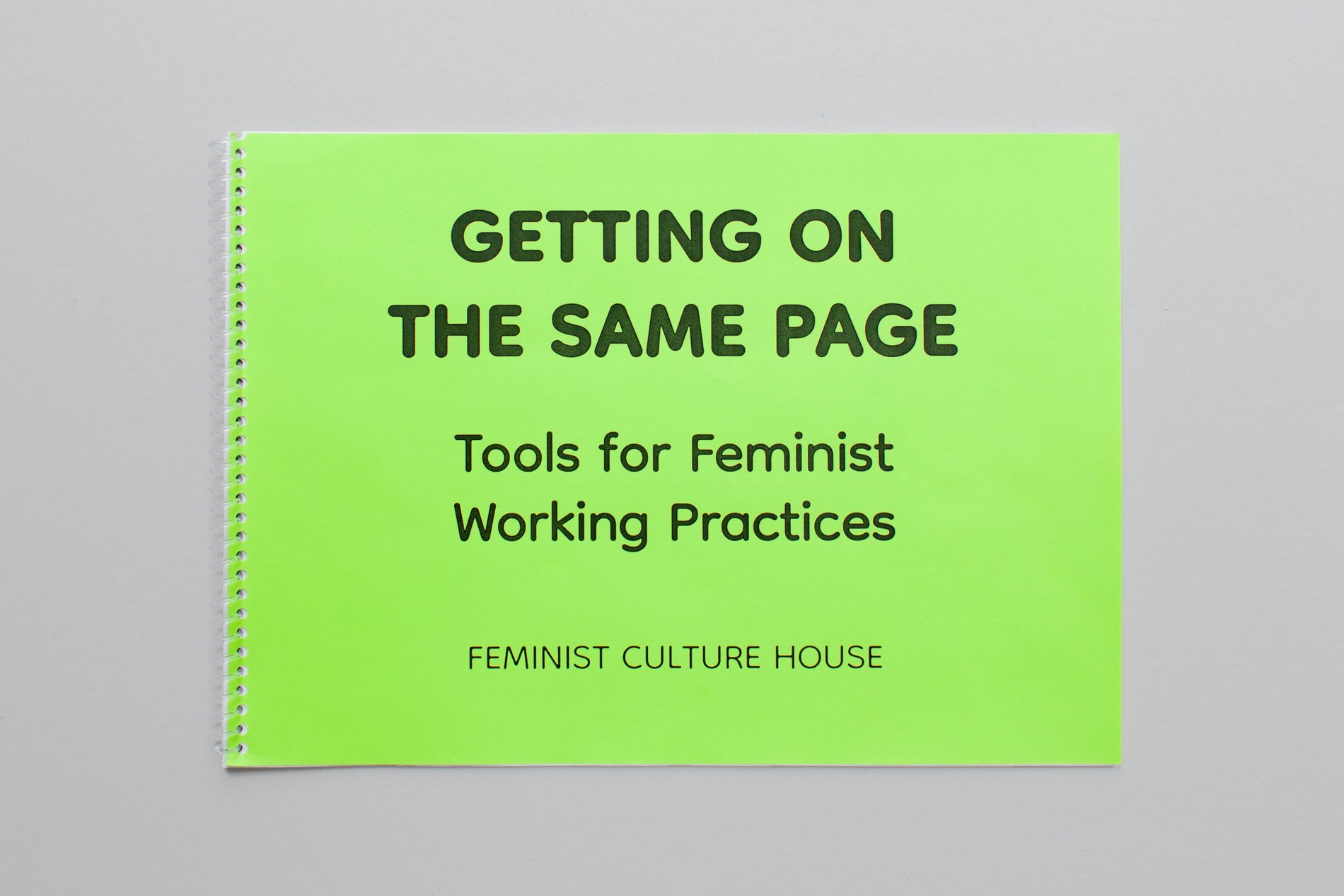
Feminist Culture House, 'Getting on the Same Page' workbook cover. Photo: Monika Żak
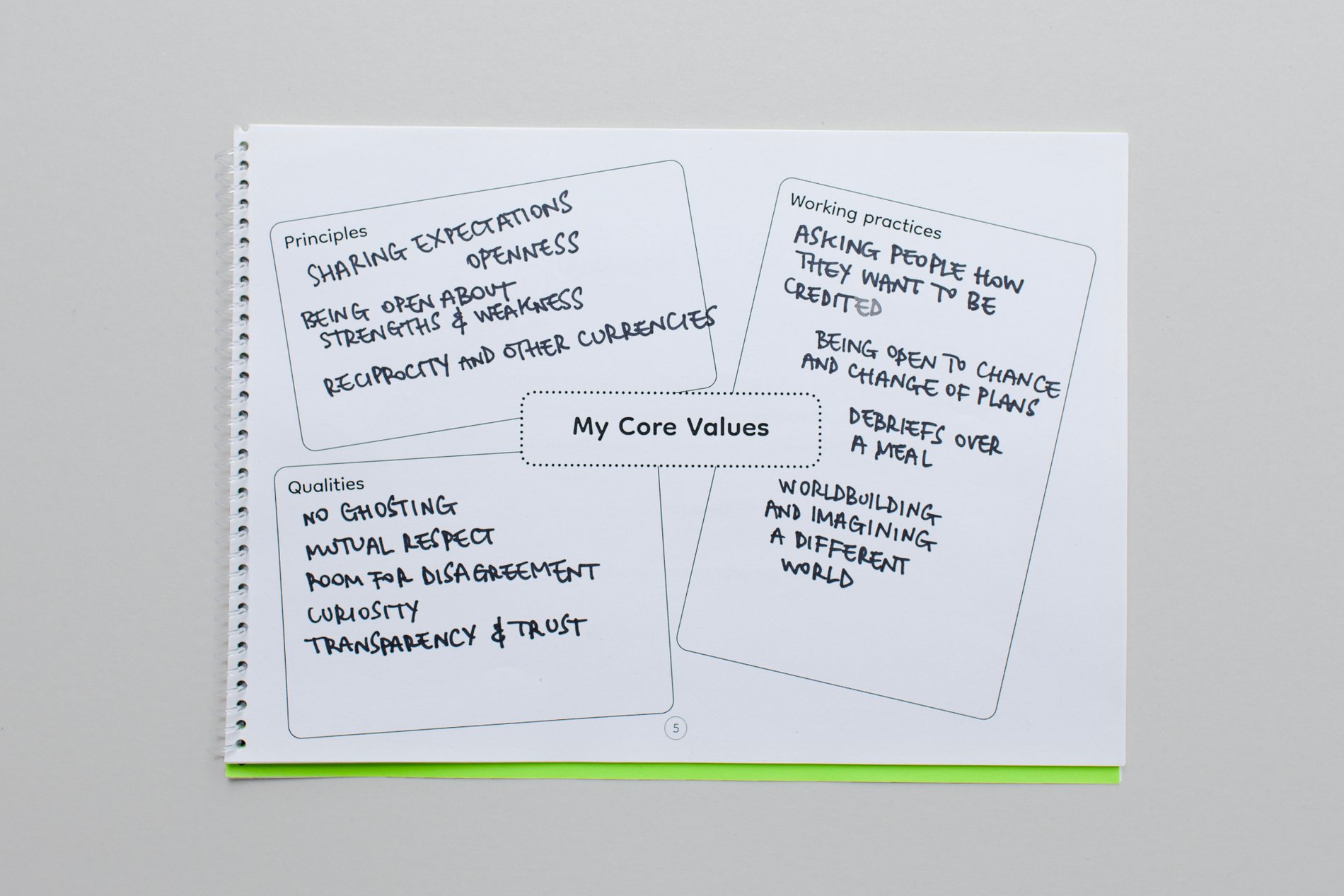
Feminist Culture House, 'Getting on the Same Page' workbook inlay extract. Photo: Monika Żak
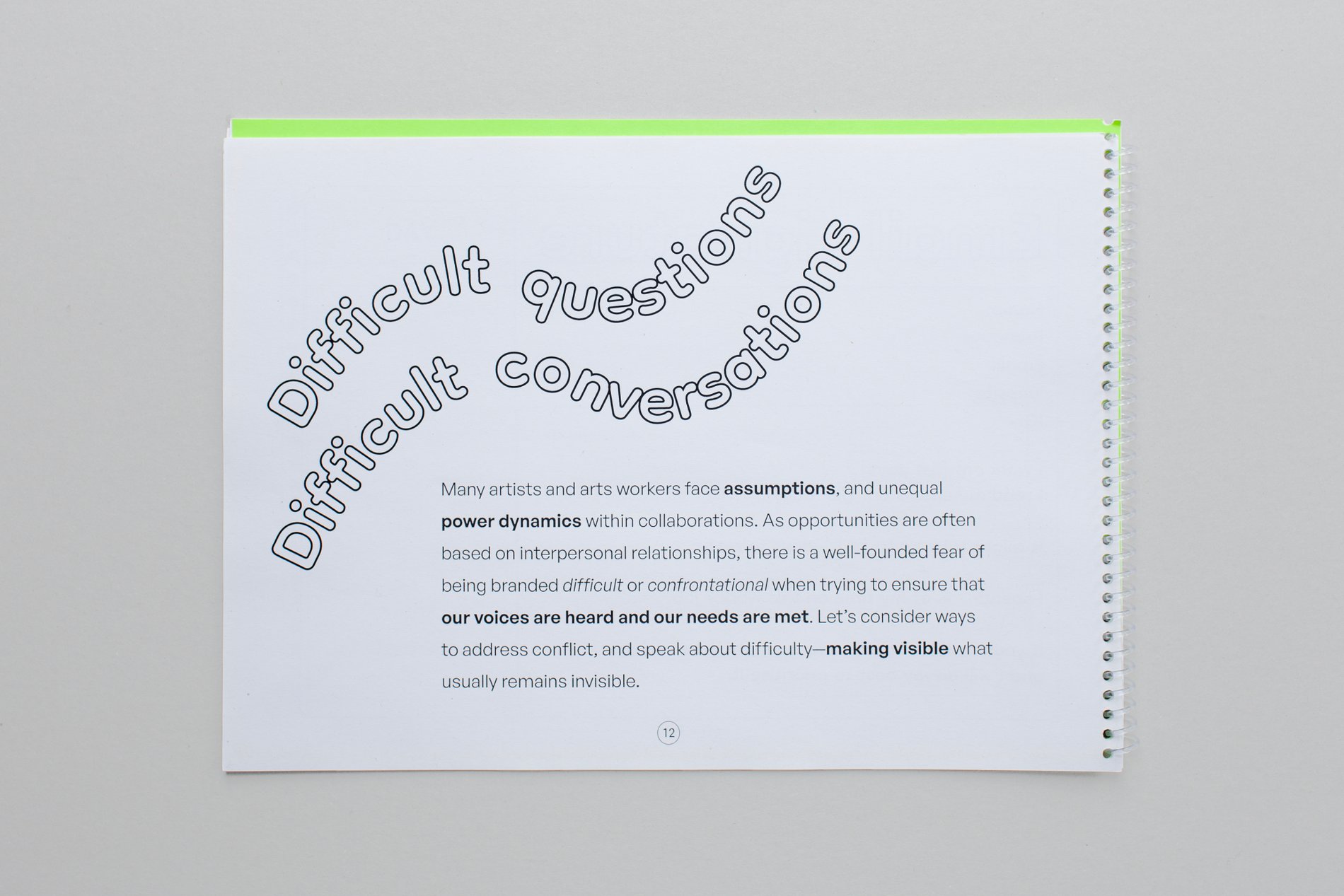
Feminist Culture House, 'Getting on the Same Page' workbook inlay extract. Photo: Monika Żak
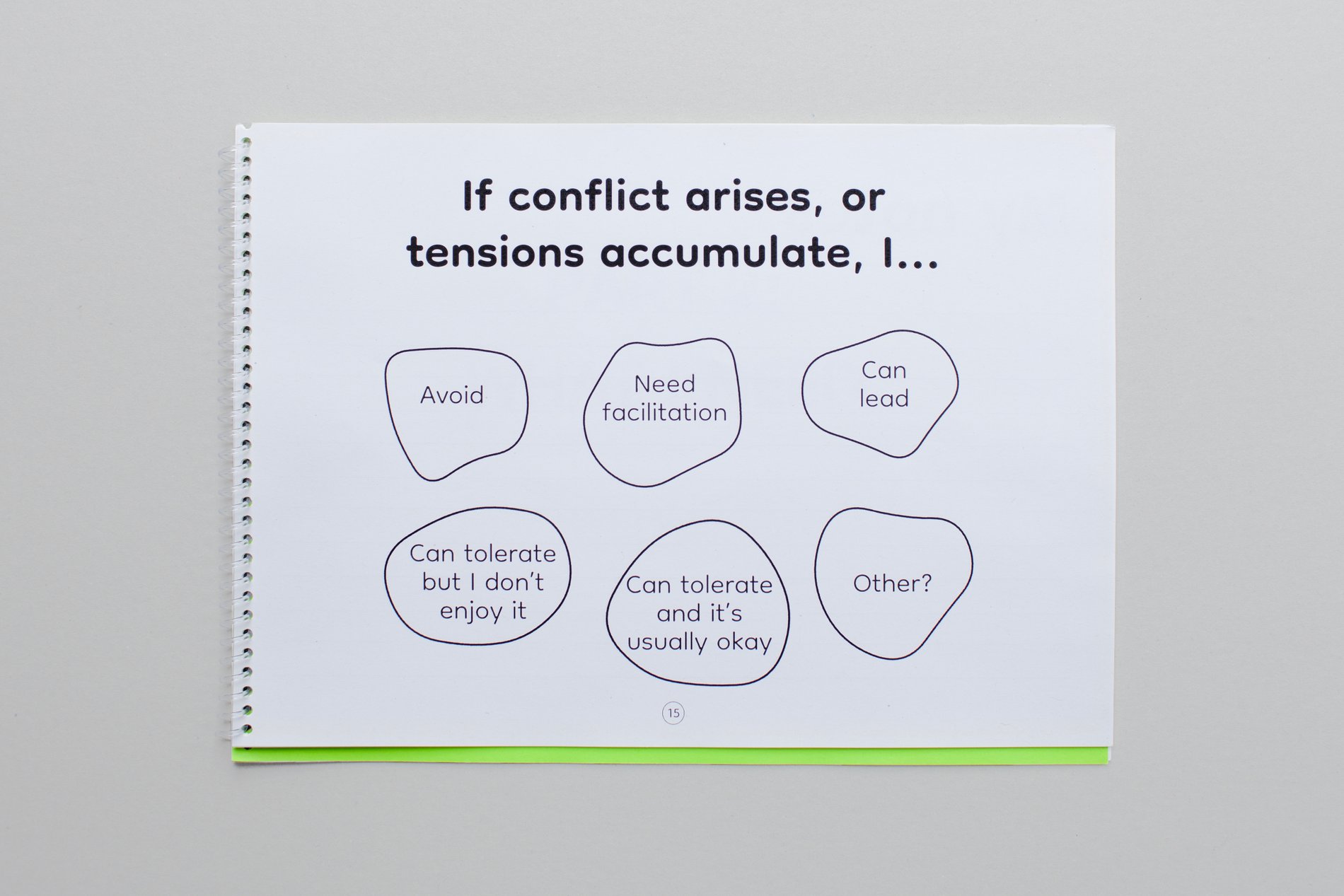
Feminist Culture House, 'Getting on the Same Page' workbook inlay extract. Photo: Monika Żak
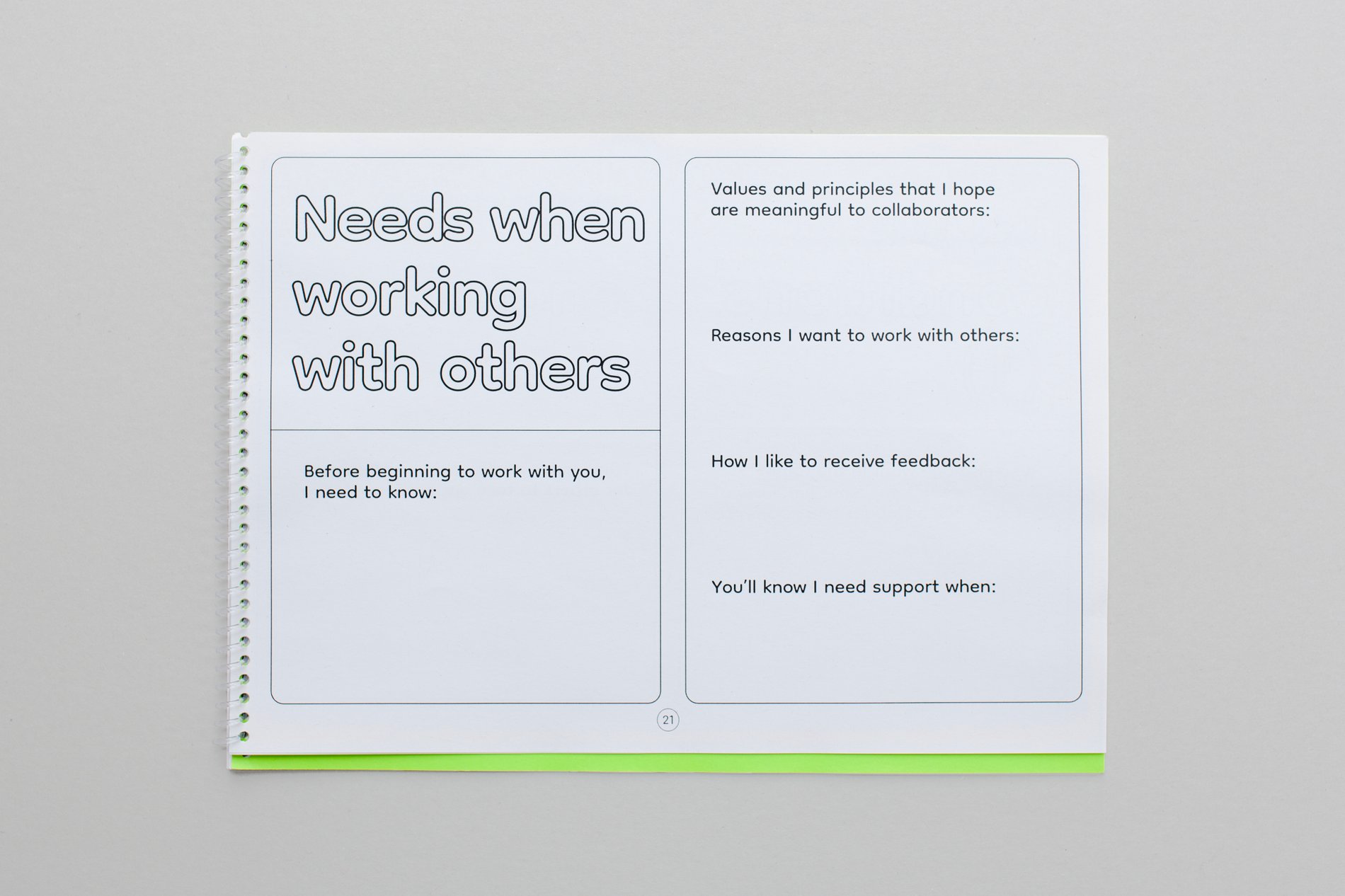
Feminist Culture House, 'Getting on the Same Page' workbook inlay extract. Photo: Monika Żak
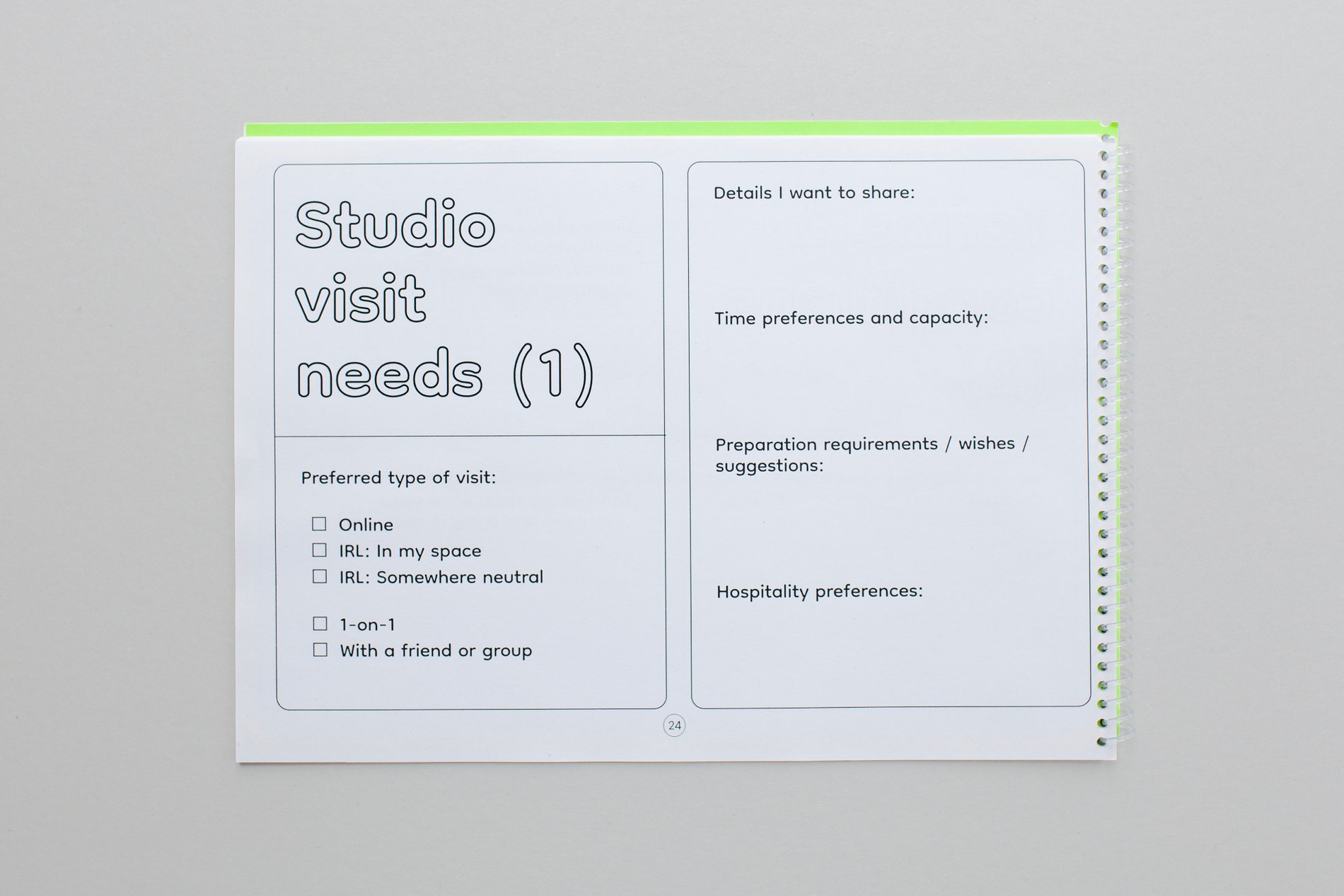
Feminist Culture House, 'Getting on the Same Page' workbook inlay extract. Photo: Monika Żak
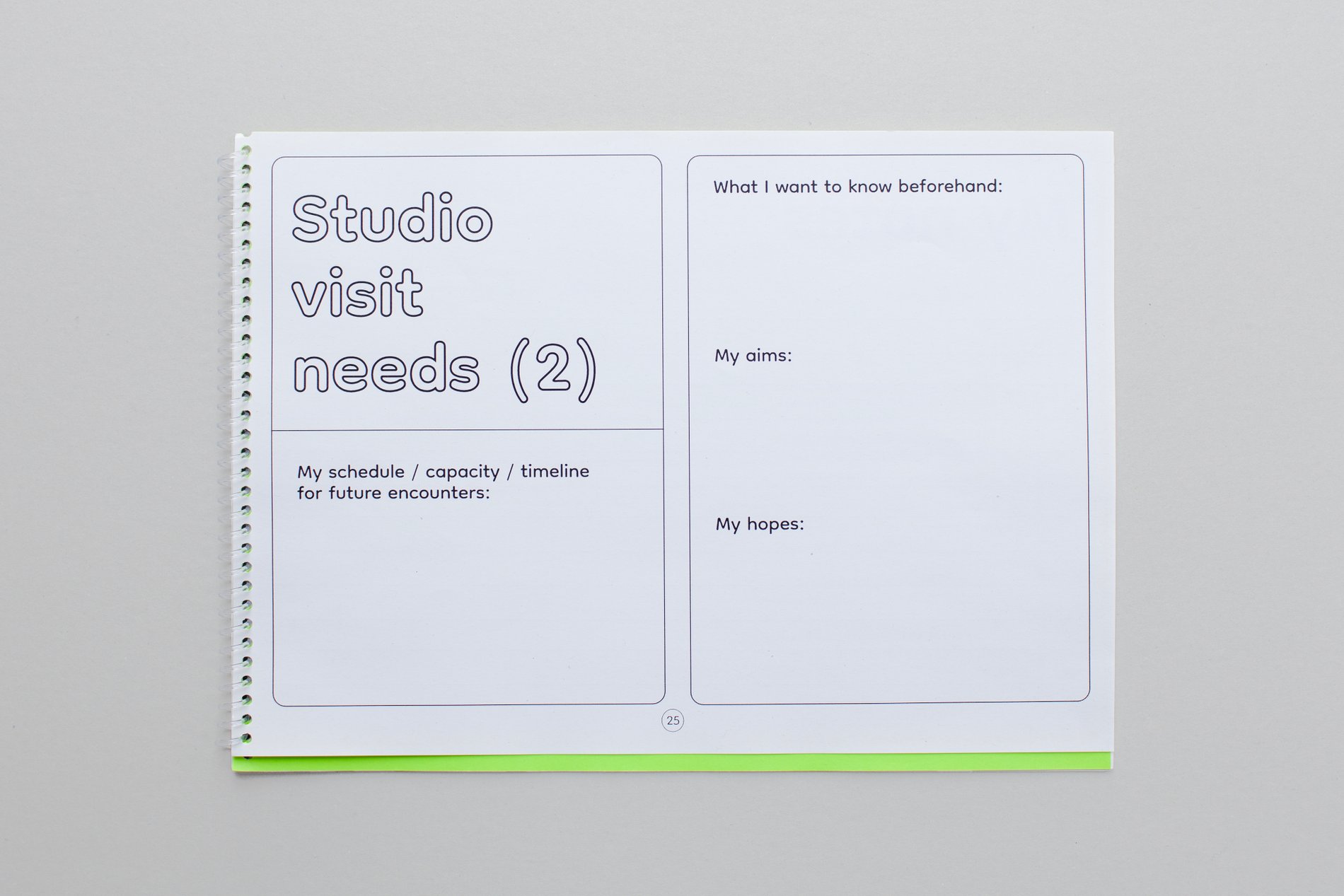
Feminist Culture House, 'Getting on the Same Page' workbook inlay extract. Photo: Monika Żak
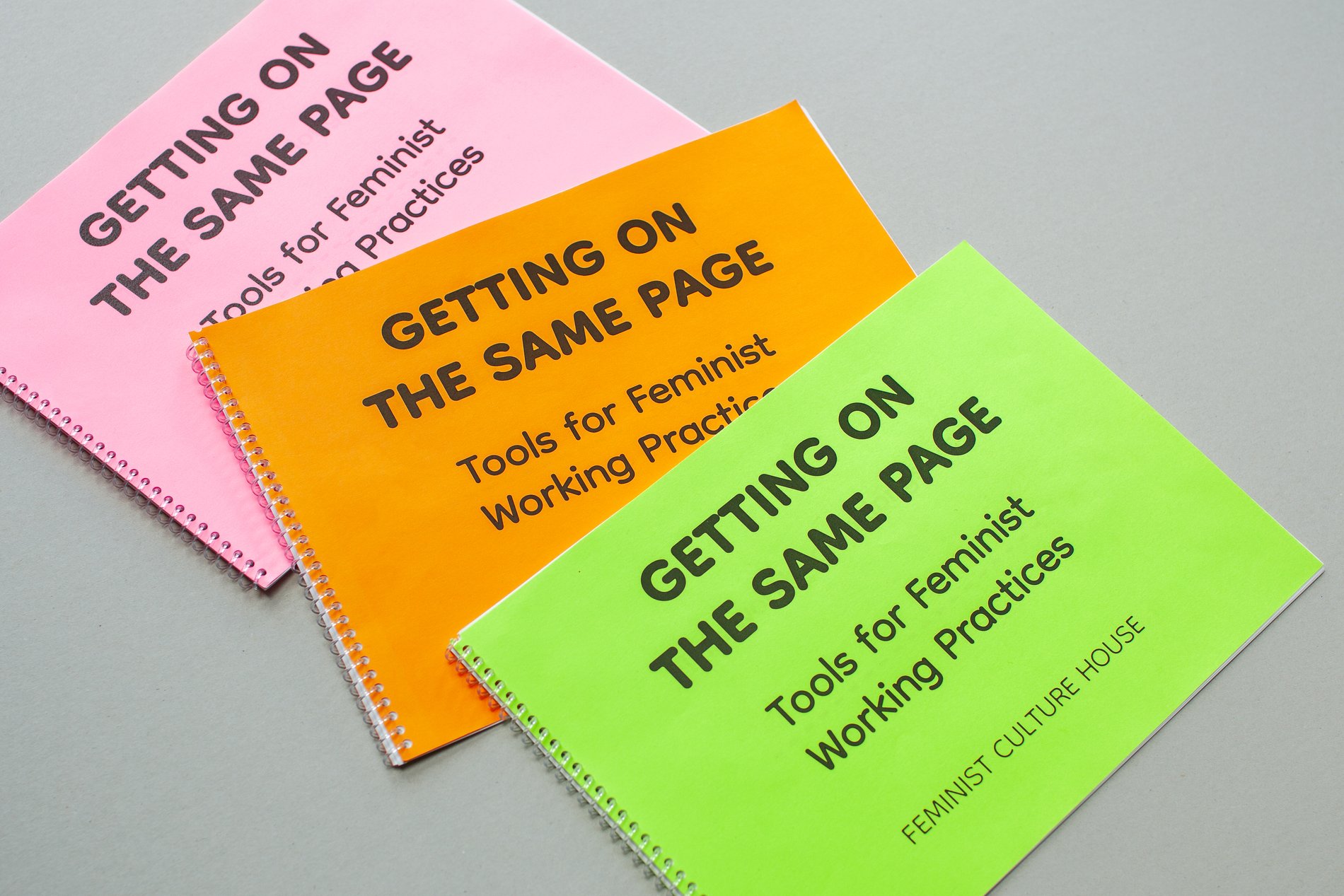
Feminist Culture House, 'Getting on the Same Page' workbook covers. Photo: Monika Żak
The workshop created a space for engaging in dialogue with topics that can be difficult to talk about. Following the workbook pages, the conversations revolved around an exchange of experiences. As organisers, together with Paola and Katie, Martina and Anne Marte took responsibility for the workshop’s gatherings in a way that allowed the participants to express struggles and solidarities. During these days, we discussed individual practices of work and everyday life, being stressed, feeling overwhelmed, and strategies of resistance.
The close-ups from the workshop’s topics first brought about a loss of world, then brought about the conditions (or possibility) for creation too. Alex Quicho writes in Without World (The White Review, 2023), “[...] what is ‘real action’? A wilful immersion in ideology. A desire to take the problems of the world pragmatically, instead of languishing in critique.” That a world hospitable to one may well be hostile to another is a truism—but ‘worldbuilding’ became an important aspect of the workshop’s conversations. In the same text by Quicho one can read:
Worldmaking as we know it always starts from worlds already on hand: the making is a remaking. [...] In its most popular use, worldbuilding refers to a practice derived from fantasy or science fiction, where systems, characters, and mechanics assemble to satisfy the expectation that a fictional world should be convincing and complete. [...] Within arts institutions, worldbuilding has gained popularity with its implication of serious research and social innovation, quelling perennial anxieties about art’s usefulness. [...] I mention all of this because of how much corporate and artistic world-building depend on and reinforce an understanding of culture, technology, and the planet as a legibly related system, where forecast and future fictions effectively digest and excrete the present.
Language reroutes thinking. The space where things change is collectivity. We all have a social responsibility for finding ways to address these challenging issues in/about/around practices together. The links and resources shared during the workshop served as de-blocking elements in moments of anecdotal rabbit-holes, and were shared with all participants and during the public event for continuous/future support. They are gathered here below, for further dissemination.
Many thanks to the workshop participants: Aasma Barakat, Patricia Carolina, Anna Ihle, Sarah Kazmi, Magdalena Kotkowska, Jelsen Lee Innocent, Lara Okafor, Ifrah Osman, Bendik Syvertsætre Johannessen, and Jessica Williams, with Martina Petrelli, Anne Marte Archer, Paola Jalili, and Katie Lenanton.

RESOURCES
This archive of resources has been developed by Feminist Culture House to share with those who attend their consultations and workshops. It is represented here in the spirits of transparency and acknowledgement, and in the hope of further pollinating the cultural field with intersectional feminist working practices.
Pronoun Go-Round (2021), an activity to facilitate the sharing of preferred pronouns. This short guide provides questions to consider and best-practice examples, and forms part of the “Teaching to Transgress Toolbox”, a collective research and study programme (2019–22) funded by the European Union. It was created by the working group Who is in the Classroom? – Flo*Souad Benaddi, Åke Sjöberg, Kolbrun Inga Söring, Eva Weinmayr. For an extended version of this guide including images, audio, video interviews, and resources, visit this page.
Wheel of Privilege and Power (2022), a visual tool developed by the Government of Canada, and distributed through the Embedding Project—a global public-benefit research project that helps companies embed social and environmental factors across their operations and decision-making. It can help individuals identify how power and privilege can be understood as intersectional. It covers thirteen categories of social identity, including Citizenship, Wealth, Gender, and Language. Each category has at least three levels of privilege. This resource may be of particular value to those who want to interrogate how their intersecting social identities relate to systems of power and discrimination (particularly in the Global North), and to professionals working on Diversity, Equity, and Inclusion initiatives.
Why Not Pitch For Free (2024), a 10-point statement by Porto Rocha design agency justifying why they refuse to participate in unpaid creative work. It’s an advocacy tool that can be shared with clients and professionals within the creative fields, particularly design and branding. Feminist Culture House made links between the labour conditions of pitching and their own work around studio visits in the cultural field, and noted similar thinking within the American Screen Actors’ Guild’s advocacy around getting paid to pitch, with Auditions Are Work.
Access Riders (2021), a collaborative publication project by artists and Feminist Culture House collaborators Jessie Bullivant and Jemina Lindholm, commissioned by Frame – Contemporary Art Finland. In response to an invitation to contribute to Frame’s 2020-21 Rehearsing Hospitalities programme, Bullivant and Lindholm worked with questions regarding responsibilities, resources, and tools when initiating conversations about access needs. Working within the framework of an access rider (a document outlining personal access needs and requirements) they invited eight other contributors to Rehearsing Hospitalities to write their own access riders, which vary in style, length, and language, and capture a range of needs, wants, limits, and boundaries. The project is both a tool and an invitation—to institutions and individuals alike—to consider initiating safer ways to open up dialogue regarding our various needs, limits, boundaries, and wishes when entering into working relationships.
Disability Access Rider (2019) is a supplement to artist Johanna Hedva’s important text sick woman theory (first published in 2016), which is often quoted in conversations around accessibility in the arts. Its central question is the provocation: “how do you throw a brick through the window of a bank if you can’t get out of bed?”
Access Docs for Artists (2018) provides information for writing an access document for disabled artists, created by Leah Clements, Alice Hattrick, and Lizzy Rose after a residency at Wysing Arts Centre in October 2018.
Access Toolkit for Artworkers (2024) is a practical resource for artworkers, such as curators, producers, and arts administrators working independently or in galleries, museums, and arts organisations. This toolkit contains practical information on how to plan, produce, and exhibit accessible art projects, and includes information on access riders, financial planning, slow production, display, and creating an accessible workplace. Author: Iaraith Ní Fheorais. Editor: Hannah Wallis. Advisers: Bridget O’Gorman, Hannah Wallis, Kat Hawkins, Jamila Prowse, Jo Verrant, Leah Clements, Linda Rocco, and Maggie Matić.
Accessibility in the Arts: A Promise and a Practice (2019) was written by artist Carolyn Lazard, and is an accessibility guide geared toward small-scale arts nonprofits and the potentially expansive publics these organisations serve. It details specific ways in which disabled people are excluded from cultural spaces, and offers possible solutions to those barriers. Moving away from historical and juridical definitions of accessibility, this guide considers the unique capacity of small scale arts organisations to meet the needs of disabled communities. It engages principles of disability justice to think through what can urgently be done to create more equitable and accessible arts spaces.
The Micropedia of Microaggressions (2021) is a collaborative project, a tool, and a community whose aim is to help people learn about microaggressions without fear of judgement. The Micropedia aims to collect everyday microaggressions, and highlight their harmful impact through source-based definitions and real-world examples. It was developed by the Back Business and Professional Association, the Canadian Congress on Inclusive Diversity and Workplace Equity, the Ted Rogers School of Management Diverse Institute, Pride at Work Canada, and a number of individuals and community organisations.
Where are you from? (2018-) is an Australian-based project created by Sabina McKenna to celebrate, educate, and raise awareness about BIPOC identities, through thought provoking art and storytelling. This question is widely normalised within many contexts, but its implications of otherness can nonetheless sting. The project’s contributors share their lived experiences, tactics, and reflections as tools for solidarity. The project has been presented at galleries in Melbourne, Sydney, and online, and its publication about textured hair was reimagined as a physical hair salon in 2021. It informed Feminist Culture House’s commissioned research about asking this question in residency contexts for Tuo Tuo, Joutsa.
Easy read artist contract (2022) by artist Jack Ky Tan, who works across performance, sculpture, law, and policy-making. He was commissioned by FACT Liverpool, when they invited him to become the first artist-in-residence on their Board of Trustees. In response, he developed this template contract for artists that aims to be accessible, easy to read, and free of jargon, something FCH strives for in their own working agreements.
Terms of Engagement (2021-) by Make or Break is a document for curators, producers, festivals, galleries, institutions, and other professionals who want to engage, commission or otherwise work with this artist collective. This living, experimental document aims to build more equitable and respectful working relationships with commissioning organisations and people. It outlines how Make or Break likes to work, and what they expect both from collaborators and from themselves. The understanding and agreement to these terms aims to develop a strong working relationship, and it’s free for artists and collectives to copy and use as a basis for developing their own terms of engagement.
What does it mean to say YES to artists? (2024) is a sample programming rubric by artist SJ Norman, who was invited to present his directorial vision for a high profile performance institution. This is his pitch, centred around listening to the needs of artists. He didn’t get the job, but he did make this powerpoint available to download—Feminist Culture House likes that this pitch-labour can circulate and inspire, and hopes this vision can be realised within a supportive institution soon.
Extra Bold: A Feminist, Inclusive, Anti-racist, Nonbinary Field Guide for Graphic Designers (2021) is an inclusive, practical, and informative (design) career guide for everyone that is part textbook, and part comic book, zine, manifesto, survival guide, and self-help manual. Feminist Culture House dreamed of writing something similar for the visual arts field, before learning their dream was already a reality! It’s written by: Ellen Lupton, Farah Kafei, Jennifer Tobias, Josh A. Halstead, Kaleena Sales, Leslie Xia, Valentina Vergara.
A White Institution’s Guide for Welcoming Artists of Color* and their Audiences (aka ‘the WIG’) by artist Fannie Sosa is a sliding scale pay-for-access pdf. A hands-on model for people working within institutions like museums, community centres, galleries, parties, workshops, concert halls, url platforms, universities, and foundations, it offers guidance about how to redistribute material and immaterial resources when welcoming and working with Black folks, people of colour, and their audiences. *(In its pro-Black, pro-hoe, femme-centric, anti academic, non-european, decolonial meaning).
ACKNOWLEDGEMENTS
Atelier Kunstnerforbundet: Martina Petrelli, Anne-Marte Archer / Feminist Culture House: Gladys Camilo, Paola Jalili, Katie Lenanton. Thank you to Feminist Culture House friends and colleagues: Joseph Baan, Jessie Bullivant, Benjamin Forster, Bec Gallo, Riikka Kuoppala, Chih-Tung Lin, Linnea Lindgren, Saara Mahbouba, Naya Magaliou, Kaitlyn D Hamilton and Joni Judén (Tuo Tuo Artist-Run Residency).
‘Getting on the Same Page’ and the collating of the aforementioned resources are covered by a Commons licence CC BY-NC-SA 4.0. This means that you can share and adapt them for non-commercial purposes, however we kindly ask you to acknowledge Feminist Culture House as the original authors.

Publisert 3. juni 2024
Sist oppdatert 8. april 2025